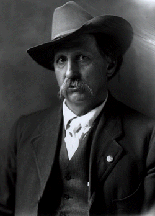Lucullus Virgil McWhorter | |
|---|---|
 | |
| Born | January 29, 1860 Harrison County, Virginia |
| Died | October 10, 1944 (aged 84) Prosser (North Yakima), Washington |
| Occupation | Farmer, Writer, Native-American-civil-rights advocate |
| Language | English |
| Nationality | American |
| Education | Self-educated |
| Genre | History, Anthropology |
| Subject | Nez Perce War, Yakama Nation's culture and spiritualism, Nez Perce culture |
| Notable works | Hear Me, My Chiefs Yellow Wolf, His Own Story |
| Notable awards | Was given a name by the Yakama Nation, "Big Foot".[1] Adopted into the Yakima Nation and given another name, Hemene Ka-Wan (Old Wolf).[2] |
| Spouse | Adelia A. Swisher (married 1883)[1] C. Annie Bowman (married 1895)[1] |
| Children | Ovid Tullius McWhorter (born 1884)[1] Iris Oresta McWhorter (born 1886)[1] |
Lucullus Virgil McWhorter (January 29, 1860 – October 10, 1944) was an American farmer and frontiersman who documented the historical Native American tribes in West Virginia and the modern-day Plateau Native Americans in Washington state. After living in West Virginia and Ohio, in 1903 he moved to the frontier of Yakima, Washington, in the eastern part of the state. He became a rancher and activist, learning much from his Yakama Nation neighbors and becoming an activist for them. In 1914 he was adopted as an honorary member of the Yakama, after helping over several years to defeat a federal bill that would have required them to give up much of their land in order to get any irrigation rights. They named him Hemene Ka-Wan,, meaning Old Wolf.
His published studies were anthropological, documenting the culture and history of the tribes. He became politically active as he represented the Plateau Native Americans against mistreatment by the United States federal government. He published accounts to report this mistreatment known to the public. He was considered an amateur in his day, but today his anthropology studies are deemed important enough to have a permanent home in Washington State University's special collections department.[1] Current scholars describe his work as "significant" in his field, and helping to preserve the cultural heritage of the Native American tribes of the Columbia Basin.[3] His papers are an "essential and valued resource", and the collection of his papers is "widely and intensively used."[3] After more than 60 years, the work he did remains "extremely valuable for outreach and teaching purpose."[3]
A reviewer of the new biography, Voice of the Old Wolf: Lucullus Virgil McWhorter and the Nez Perce Native Americans, in the Universe Magazine, Spring 1997,[4] quoted the author, Alanna Kathleen Brown, as saying that McWhorter was an "amazingly interesting, courageous, dedicated, and insightful man."[4] Of his accomplishments, she said: "McWhorter dedicated his energies to comprehending the cultures of the Native American tribes who surrounded him, and he committed himself to recounting the legends and epic personal stories of those he saw passing. McWhorter also continually argued for fair treatment and decency towards Native Americans whenever he could be an advocate."[4]
- ^ a b c d e f g Ault, Nelson; Kliger, Lisa (2021). "Finding Aid: Lucullus Virgil McWhorter Papers, 1848-1945 (Cage 55, Manuscripts, Archives, and Special Collections, Washington State University Libraries, Pullman, WA)". Archives West. ORBIS Cascade Alliance. Retrieved 2024-07-11.
- ^ Letter, Louis Mann to Lucullus Virgil McWhorter, December 16, 1916. Box 33, in Manuscripts, Archives, and Special Collections (MASC), Washington State University.
- ^ a b c Association of Research Libraries. "Celebrating Research, Lucullus Virgil McWhorter Papers 1848–1945, Manuscripts, Archives, and Special Collections". Retrieved 2011-12-27.
- ^ a b c Alanna Kathleen Brown. "Voice of the Old Wolf: Lucullus Virgil McWhorter and the Nez Perce Native Americans". Archived from the original on 2014-04-26. Retrieved 2011-12-27.